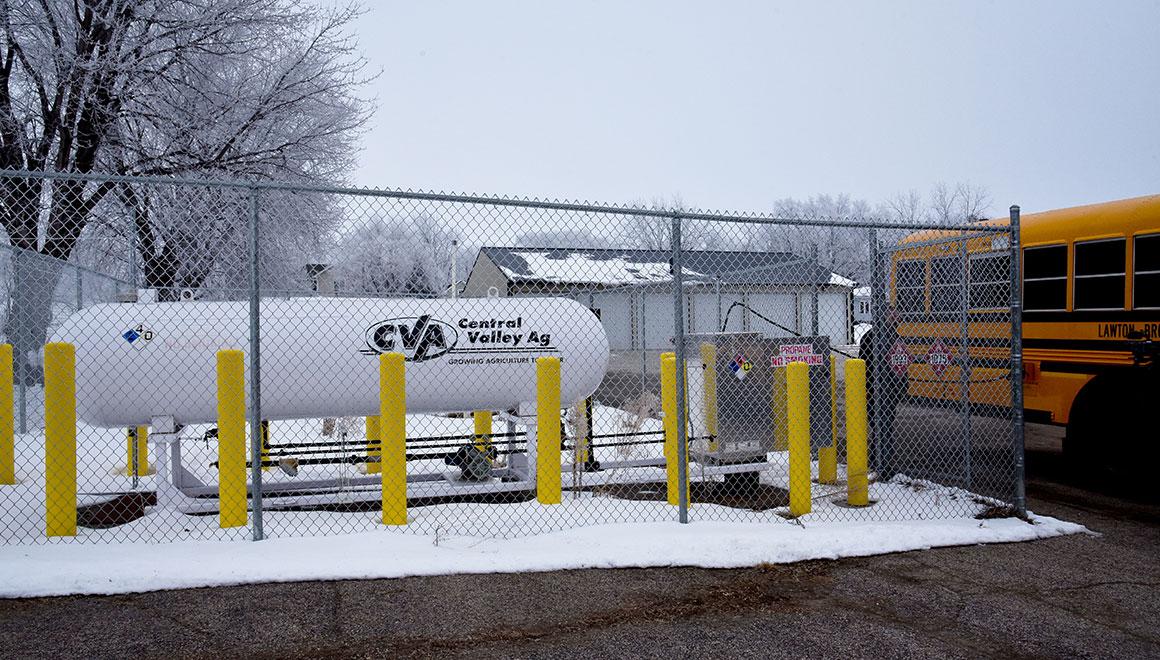What is Propane Autogas?
Jan 16, 2023

Propane and propane autogas are the exact same product. The difference between the two is the application the propane is used for. Propane is commonly used for home heat, hot water heaters, cooking, crop drying and powering industrial and farming equipment. Another rapidly growing application for propane is autogas. Our society is focused on protecting the environment and preserving natural resources. Propane autogas does just that. It is the world’s most popular alternative fuel, which is defined as any product that bypasses the two big traditional petroleum fuels: gasoline and diesel.
So, what is it?
Propane is a compressed gas that is stored as a liquid. It is nontoxic, colorless, and virtually odorless. The propane that you and I are familiar with does have an odor. Ethyl Mercaptan is an additive that is combined with propane to create an identifying odor to alert users in case there is a leak in their application. Propane is primarily a byproduct of domestic natural gas processing, though some propane is produced from crude oil refinement. Propane autogas is a clean burning alternative fuel that has been used for decades to power light, medium, and heavy-duty propane powered vehicles. Growing interest in propane as an alternative transportation fuel stems from its clean burning qualities, affordability, reliability and its abundant supply that is produced right here in the US.
What are the benefits?
- Safe: Propane autogas is a very safe alternative fuel that is nontoxic, not-corrosive and insoluble in water. Fueling your vehicle with autogas is safe and simple. Autogas fuel tanks are 20 times more puncture resistant than gasoline tanks.
- Environmentally friendly: Autogas is a clean-burning fuel that produces fewer harmful emissions than gasoline. If spilled or released from a vehicle, it presents no threat to soil, surface water, or ground water. Propane reduces emissions and its exhaust creates 60-70% less smog-producing hydrocarbons than gasoline, which results in significantly less NOx and greenhouse emissions compared to diesel and gasoline powered vehicles.
- Affordability: Autogas has historically been $1.00 per gallon less than other fuel sources such as gasoline and diesel. This can make autogas an extremely cost-effective solution. Preventative maintenance costs between a diesel-powered engine versus a propane powered engine are astronomical, the diesel cost to change the oil can be as much as $200.00 higher per service than the propane powered engine.
- Reliability & Performance: Propane has a high-octane rating, making it an excellent choice for spark-ignited internal combustion engines. Its high-octane rating, combined with its low carbon low oil contamination characteristics, can result in improved engine life compared to conventional gasoline engines. Cold-start problems experienced with diesel powered units can be reduced also. Propane’s mixture is completely gaseous when entering the engines combustion chamber, and propane engines do not require an enriched fuel mixture during cold-weather startups the way other liquid engines do.
- Abundant supply: 98% of autogas is produced in the US. This makes autogas low in cost compared to other fuel sources. Using autogas means reducing our dependence on foreign oil and creates jobs here in America.
Who produces autogas powered vehicles and can existing engines be converted?
Some of the auto manufacturers that currently produce bi-fuel models that can run on autogas include Fiat, Ford, Hyundai, General Motors, Toyota, Volvo, and Volkswagen. Some vehicles that were not manufactured to run on autogas can easily be converted to do so with EPA certified conversion kits costing in the range of $6,000 to $8,500, which can be recouped in the form of fuel savings and maintenance over time. Ford has been leading the way with bigger propane autogas motors, they have a 6.8L V-10 stationary engine for irrigation use and 6.8L V-10 that they put in Bluebird School buses that run on propane autogas.
Rebates?
We all like incentives, especially with the costs of everything right now. There are propane incentive programs available for switching over to propane powered vehicles and stationary engines. They are available for farm, fleet and even school bus applications. These incentive programs are available through state and government programs as well as CVA.
What does the future look like?
Propane autogas is the way of the near future. School districts and fleets all over the country are switching to propane powered school buses and are enjoying the cost savings, lower emissions, and overall performance of the buses. Propane powered buses can go farther than their electric counterparts and are less in price. In a world that is being pushed to go electric, propane is leading the way of an alternate solution to energy. It’s domestically produced, cleaner, a better value and environmentally friendly! Propane, it’s the future of clean energy, today! If you would like to talk about fueling your fleet with propane autogas reach out to me at Kelly.stenka@cvacoop.com or give me a call at 402-389-0765.